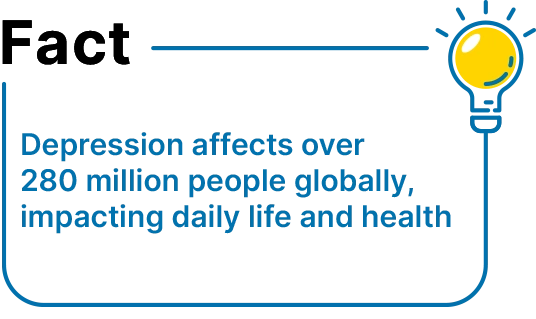Depression – Gentle, Holistic & Personalised Treatment
Supporting Mental Wellness with Expert Homeopathic Care
Book your Appointment
Depression is one of the most common yet misunderstood mental health conditions today. It affects how you think, feel, and function, often overwhelming daily tasks. According to the World Health Organisation (WHO), over 300 million people globally suffer from depression. In India alone, more than 45 million people are affected, with rising cases of bipolar disorder and mood instability in the 20–45 age group
At Dr Batra’s®, we believe mental health deserves the same personalised, root-cause treatment as physical health. Our MindFit Program offers a unique, integrated approach to managing depression and stress related disorders through personalised homeopathy, counselling, stress coaching, and lifestyle support safely, naturally, and without side effects
For those seeking expert guidance, Dr Batra’s® is a trusted name that offers Homeopathic Treatment for Female Sexual Dysfunction. Here’s why:
Holistic Treatment
Holistic Mental Health Treatment Backed by 40+ Years of Expertise
Root-Cause Diagnosis
Each treatment starts with in-depth analysis of emotional triggers, be it grief, stress, hormonal changes, or lifestyle disruptions, to treat the root cause of depression
Personalised Homeopathic Remedies
We design a treatment unique to your emotional and physical symptoms using safe, non-sedative, and non-habit-forming medicines
Emotional & Physical Support
Our remedies stabilise mood and energy and improve associated issues like fatigue, sleep problems, and appetite loss
Long-Term Wellness Focus
We focus on consistent care that brings emotional clarity, improves daily functioning, and prevents relapses
Major Depressive Disorder (MDD)
Persistent low mood, fatigue, and loss of interest in activities
Bipolar Disorder
Alternating periods of depression and elevated (manic) mood
Dysthymia
Chronic low-grade depression lasting for years
Seasonal Affective Disorder (SAD)
Depression triggered by seasonal change
Postpartum Depression
Emotional lows following childbirth
Sangeetha battled severe depression with anxiety and insomnia. After starting personalised homeopathic treatment at Dr Batra’s®, her symptoms eased and she made a full recovery. Today, she leads a balanced, depression-free life
Persistent sadness or hopelessness
Loss of interest in daily activities
Fatigue or low energy
Sleep disturbances (too much or too little)
Changes in appetite or weight
Irritability or restlessness
Feelings of guilt, worthlessness, or low self-esteem
Suicidal thoughts or self-harm tendencies
Genetics
Family history of depression or bipolar disorder
Hormonal Imbalance
Thyroid issues, PCOS, or postnatal changes
Chronic Illness
Conditions like diabetes or chronic pain
Stress & Trauma
Loss of loved one, sexual abuse,drug abuse, financial stress, or breakups
Neurotransmitter Imbalance
Low serotonin or dopamine
Lifestyle Factors
Poor sleep, sedentary habits, substance use
Digital Overload
Excessive screen time and social isolation

| Feature | Homeopathy | Conventional |
|---|---|---|
| Addresses Underlying Causes of Depression | ||
| No Side Effects | ||
| Personalised treatment | ||
| Emotional Healing | ||
| Dependency Risk | ||
| Long-Term Improvement |
At Dr Batra’s® MindFit Program offers a safe, non-addictive, and holistic approach that blends homeopathy, counselling, nutrition, and fitness for complete emotional healing
Personalised Care
Tailored treatments for anxiety, depression, stress, and more
Mind-Body Balance
Meditation, breathing exercises, and fitness support
Safe & Natural
100% natural remedies with no side effects or dependency
Inclusive
Counselling in 24 Indian languages
Expert Team
Homeopaths, psychologists, nutritionists, and coaches
Measurable Progress
Regular assessments to track emotional well-being

At Dr Batra’s® MindFit Program offers a safe, non-addictive, and holistic approach that blends homeopathy, counselling, nutrition, and fitness for complete emotional healing
If you feel stuck in a cycle of low mood or anxiety
If you're experiencing mood swings or signs of bipolar disorder
If you want natural, side-effect-free mental health care
If you're already on antidepressants and want integrative support
If you’re seeking a safe space to understand and heal emotionally

Depression involves persistent sadness and loss of interest, while Bipolar Disorder includes mood swings ranging from depressive lows to manic highs. Both require personalised treatment to address emotional and hormonal imbalances effectively
Homeopathy works by treating the root causes of emotional distress, supporting hormonal balance, and improving overall mental wellness. It’s gentle, non-addictive, and suitable for long-term care
Yes. Homeopathic remedies are natural, free from side effects, and safe for all age groups. They don’t involve sedatives or chemical dependency, making them ideal for emotional health
With homeopathy, many patients experience improved emotional stability without relying on antidepressants or mood stabilisers. However, treatment plans are personalised and may complement conventional therapies if needed
The duration varies depending on the individual’s symptoms, severity, and overall health. Many patients report improvement within a few weeks, with continued progress through regular monitoring and support